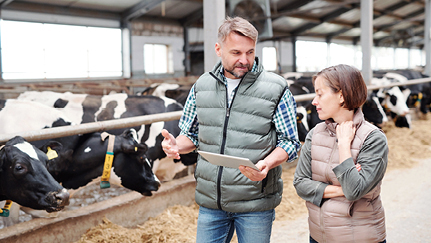If you are a farmer, rancher or agribusiness operator, you may feel like you aren’t at risk or do not need to create a formal business continuity and contingency plan. It’s a process that takes time and often involves thinking about difficult situations that can disrupt operations. It’s something most people don’t want to think about.
But situations like severe weather and health and safety scares like the COVID-19 pandemic show the importance of being prepared for when things don’t go as planned. The more you plan ahead, the better you’ll be able to adjust to situations like these that disrupt operations. And the better you’ll be able to adjust, the quicker you’ll be able to get back up and running.
Building a business continuity and contingency plan starts with a thorough self-assessment. Ask yourself these questions:
- What are your greatest vulnerabilities and threats?
- Which ones are most likely to disrupt your operation?
- Which ones could affect your business most severely?
Create concrete plans
The disruptions that have the highest combination of severity and probability of interrupting or halting your business are the ones that require detailed, structured plans.
For example, the COVID-19 pandemic has posed the greatest threat to the farm workforce given its health risk and the ramifications of widespread work stoppages. But a global pandemic is far less likely than crop damage from a strong windstorm or tornado.
The latter may have a more localized adverse effect on your operation, but it’s historically happened with a much higher frequency than the former. Consider the effects of such dangers specific to your operation as well as on a more macro-level, taking into account your customers and marketplace beyond the farm gate.
Account for specific situations
Once you’ve adequately prioritized your farm’s vulnerabilities and greatest risks, consider your output and how it will be affected by those risks. Just like with an initial self-assessment, this step involves asking a series of questions your agribusiness continuity and contingency plan should answer. Ask questions like these:
- How will you continue to operate? If you manage an agritourism business, for example, will you be able to remain open to visiting customers? If you’re a grower or small processor, how will output and market access be affected?
- What specific business processes or operations will be disrupted? Which ones can continue?
- What are the consequences of your operation being disrupted? Are there any specific functions your operation can do without if necessary?
- How long can your operations be disrupted before you lose revenue or equity erodes?
Don’t forget your workforce
The answers to the above questions will likely involve your workforce and how it can contribute to resuming operations in a comprehensive contingency plan. Think about the specific tasks for which each member of your workforce is responsible and how those tasks could be disrupted in the event of something like a severe storm or illness. Consider how you can delegate different jobs to individual employees differently if some parts of your business are disrupted.
And if those jobs are temporarily slowed or halted altogether, think about how to continue to meet the needs of your workers. Doing so has potential long-term benefits; planning for how you will work through a localized COVID-19 outbreak, for example, accounts for the health and safety needs of workers in the short term and instills confidence that you’re acting both on behalf of your agribusiness as well as their safe, secure contributions to its productivity.
Start with these resources
At the end of the day, building a well-thought-out contingency and continuity plan for your agribusiness may not be the most desirable task in the world, but given its importance in the event of something like a severe storm or outbreak of an illness, it’s something every agribusiness owner and manager should prioritize. Review a few helpful resources:
Consult your operation’s team of trusted advisors, including your local Nationwide farm agent, to start the process today.
